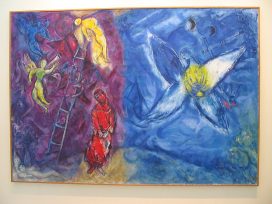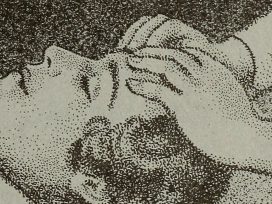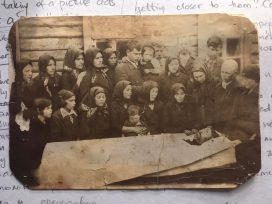Belarus is one of the darkest corners of our continent. The contacts with the outside world are limited, the opposition is harassed, human rights are not respected, mass media is heavily censored. In June, a new law on the mass media was approved that strictly regulates Internet journalism and forbids media outlets from accepting foreign money. The law also mandates up to two years of imprisonment for journalists who reproduce foreign media reports that “discredit Belarus”.
But there is a shining light in this darkness: the European Humanities University (EHU), which started up in Minsk in 1992 and operated until it was closed by the regime in 2004. Since 2005, the EHU has been operating in Vilnius, where it prepares young people for a better future for their country.
This university in exile is, at present, the only one of its kind. Its vice chancellor, Vladimir Dounaev, can cite a few earlier, historical cases. One was the Baltic University that was established in Germany after the Second World War. It did not remain open for long, since it could not gain recognition for the degrees it awarded. The New School for Social Research in New York was founded largely by Jewish scholars forced to leave Germany during the Hitler years, including Hannah Arendt and Leo Strauss. It later became an American university, but maintained a strong European flavour.
More than 500 undergraduate students are living and studying in Vilnius. The BA students live in dormitories and engage in “face-to-face” studies in classes. About 200 graduates carry on to do their master’s degree with intermittent intensive sessions. In addition to the BA and MA programmes, hundreds of students participate in long-distance learning and low residence programmes.
Eighty per cent of the teachers at the EHU are Belarusians. The rest are mostly Lithuanians, particularly in the language courses.
To visit the EHU is a refreshing experience. It demonstrates that dedicated people can achieve a lot when they combine their resources: the teachers do not give up in the face of dictatorship, the students are not afraid to take risks and the foreign donors work together for a better European future.
Behind the EHU lies a truly international effort. The Nordic Council of Ministers coordinates the assistance, the European Union is the biggest donor, and private foundations and universities participate in the work. But all internal decisions are made by the dedicated people that founded the university in the 1990s.
After visiting EHU I am convinced that this university, its students and its teachers, constitute the best hope for the future of Belarus.
The Nordic Council of Ministers and its office in Vilnius played a key role in the establishment of the European Humanities University in Vilnius. This was not only a matter of financial aid but also one of offering help in adjusting the curriculum to the Lithuanian system and the Bologna Process.
Here, much help was received from office director Teppo Heiskanen, who has a lot of experience in Finnish university administration. He had no idea how useful this experience would be when he arrived in Vilnius in 2003; his task was to take care of what were primarily cultural contacts between “Norden” (that is, the Scandinavian countries, Finland and Iceland) and Lithuania. That this project suddenly popped up came as a complete surprise and was a positive challenge:
“Only once in a lifetime does one get a chance to establish a university anew.”
He tells the story of how it all happened:
“Both Lithuania and the EU came to us in the spring of 2005 and asked us if we could handle the administration of the project. We felt this was a way of supporting the process of democratisation in Belarus together with the EU. The Council of Ministers supports EHU in Exile because of its special role: it is the only Belarusian university in the world that is free. We cannot accept that a university is closed down because it wants to give a free education, in line with Western criteria.”
Teppo Heiskanen has been an integral part of the entire process in Vilnius. The project to develop the university so that it could gain the approval of the Lithuanian authorities was carried out together with the American Macarthur Foundation which also lent its support to the EHU when it was located in Minsk. Among other things, an international board of directors, which held its first meeting this February, has been established. The board’s chair is Per Unckel, currently county governor of Stockholm County, but formerly secretary general of the Council of Ministers and well-acquainted with the process.
The board of directors also includes Olli Loukola from Helsinki University, which is in the process of establishing an international network for students of philosophy for which Loukola is the coordinator. Helsinki University and Södertörn University are the foreign universities that have the broadest contact with the EHU.
A project agreement with EU on support for EHU has been concluded. The next step will be to establish a trust fund to be able to coordinate the foreign support. The fund was created on the initiative of Benita Ferrero-Walder, EU commissioner for foreign relations. The support comes from the EU, but also from individual countries such as Sweden, Finland, Norway, Hungary and France, and Teppo Heiskanen believes that the number of donors will grow. The fund will be administered by the Council of Ministers.
The Council has the advantage that it is already established in the Baltic countries, and already has a structure in place.
Sweden is the largest single donor country, and gives money through at least four channels – through the Council of Ministers and EU, and bilaterally through Sida and Södertörn University, which collaborates by, among other things, contributing lecturers.
It is not easy to establish an entire university in a foreign country. It has also been done within a very short time span – only a year. That the EHU is approved as a university here means that the programmes and diplomas are Lithuanian and recognised in all of the EU. Within the EHU itself, a lot of work has been carried out and lessons have been learned in the process; their programmes have also been developed to meet Lithuanian requirements.
It has also involved a great deal of extra work for the office of the Council of Ministers, but Teppo Heiskanen finds this very motivating.
“It is always refreshing to meet the students. When we talk with them we understand why we are doing what we do. They are willing to sacrifice a good deal for a better future for their country, they take great personal risks. The Belarusian authorities are the worst problem, they show a great interest in EHU’s activities, and the students are closely monitored at the border.”
The distance between Minsk and Vilnius is only 75 kilometres so the journey itself is no great problem – but the border is.
“The students have not been imprisoned for enrolling in the EHU, but some have been arrested and questioned about their political activity, and some have been forced to leave Belarus. But most of them can still travel. The treatment of students and teachers is in accordance with general developments in Belarus, and conditions have become noticeably more difficult. The United States Embassy has been reduced to a handful of diplomats, and in March the authorities cracked down on journalists.”
Teppo Heiskanen has enjoyed his time in Vilnius. “It is a pretty city, very compact. It takes 45 minutes to walk from the one end of the old city to the other. Great changes have taken place, particularly during the twentieth century but also during the five years I have lived here.”
“The democratic institutions are in place, and now values and norms are also undergoing change. In this area the Nordic countries have much to give. We can, through our presence here, demonstrate a certain way of functioning. Finland and Denmark can be seen as quite different to one another, but here in Vilnius one sees that they have a good deal in common.”
Lithuania has a lot to offer the world as well. “No one granted Lithuania its freedom; it was the Lithuanian people who took it. The Lithuanians were so determined and did it without shedding blood – it is one of the great stories in Europe and in our time.”
Now Lithuania is going forward. There is, to be sure, a certain interest in borrowing from the Nordic countries; the Lithuanian system of ombudsman is for instance taken directly from Norway.
“The concept of the Nordic countries is perceived 110 percent positively in Lithuania. There is no historic burden of guilt – unlike in Russia, Germany and Poland.”
At the same time, Heiskanen notes that the Baltic state societies are rather conservative when compared to those of the Nordic countries. There are, for instance, problems in relation to minorities and concerning equal treatment of men and women. Here we have something to contribute. “But we could re-learn from the Baltic countries about the drive that people have here, they want to do things themselves and create something. Life is pretty easy in the Nordic countries, we have, perhaps, forgotten what it means to give our all.”
Arturos Vasiliauskas works with donor contracts to the EHU at the Vilnius office of the Nordic Council of Ministers. Up until now there has been a complicated system in place using different contracts for the different donors – maybe things will be simpler once the trust fund starts operating. He is a historian, his other position is as teacher at the University of Vilnius. But his studies are perhaps of more use than his work at the EHU for the task he performs for the Council of Ministers: he has a Master’s in Modern History from the Central European University in Budapest and a Ph.D. from the United Kingdom, all of which means that he has had a lot of experience in encounters between cultures.
“This gave me a competence on European and international level, an understanding of Eastern and Western attitudes. I’m a typical ‘new Lithuanian’, with an understanding of the post-Soviet way of thinking.”
This is useful in a project where many different cultures meet – not only the cultures of Belarus, Lithuania and the Nordic countries.
“You have to recognize both political and cultural aspects and also know the bureaucracy of the European Union.”
Arturos Vasiliauskas finds it meaningful to work with Belarus, not least because of its medieval past as part of the Lithuanian commonwealth.
“Now we can help Lithuania to come back to the family of nations that have escaped from the Soviet empire.”
“It’s interesting to compare the students at EHU with Lithuanian students. The students from Belarus have much stronger motivation. They take risks playing games with the authorities. The Belarusian leader Alyaksandr Lukachenka complained that the EHU is educating a new elite who would lead Belarus to the West and therefore the university was shut down in Minsk. And he was right.”
A BA degree from Belarus is not valid in other countries. This is why many young people who wish to pursue higher education come to the EHU. Some of the students there are engaged in politics, while others are primarily looking for better education, independent of government control.
The language requirements are strict. At the end of the second year, the students are expected to speak both English, and either German or French. This should, according to Arturos Vasiliauskas, give them an impulse to open up to Western values.
“We expect EHU to stay here only temporarily, even if we don’t now when they can move back. At that point, EHU will be an institution that can be an example of Western working methods. Here in exile it has not only been surviving, it has improved its culture, it’s more open now, and it’s growing, offering better conditions also for its professors and teachers.”
According to Arturos Vasiliauskas, more than 90 percent of the first students that graduated last year returned to Belarus. There they work in NGOs, in the independent press or as independent lawyers. Their degrees are not recognized in Belarus, which is the only country in Europe that is not taking part in the Bologna process.
The European Humanities University has its roots in the nineties, when Belarus became independent. The Chancellor of the university, Anatoli Mikhailov, describes the sorry state of higher education in the country at that time:
“The natural and technical sciences and mathematics was well developed in the Soviet Union, but in social sciences all was developed in confrontation with the basic values of European civilization in a very peculiar way. Everything connected with the West was criticized as bourgeois or imperialist.”
A second problem was that the upper echelon of higher education was concentrated in Moscow. All specialized institutions, such as the Institute of Europe, were located there, as were the big scientific libraries.
“After the collapse of the Soviet Union all this remained in Moscow, we were left on our own. Not much research was done in Belarus.”
After independence, the management of the Belarus State University wanted to continue as before. EHU’s Vice-Chancellor Vladimir Dounaev, another of the founders of the new university in 1992, describes the situation.
“We worked at the Belarusian State University and encountered a lot of problems and very strong resistance when we tried to introduce reforms. We decided that the best solution was to establish a new university following a Western model, with both undergraduates and graduates, based on academic freedom and university autonomy.”
“Our decision to start something new became even stronger because of the behaviour of some of our colleagues at the state university who fought for the continuing dominance of Marxism-Leninism. Their argumentation was like in 1951, not in 1991, it was like in Stalin’s time.”
Chancellor Mikhailov admits that the decision to start a new university was not easy:
“It was probably, and is still, a crazy idea. Since the communist idea destroyed critical thinking we had to create something new from nothing. But it was clear to us that without such an initiative the situation would be worse still. First of all we needed intellectual potential. Our idea was to create conditions where the formation of such a potential could take place. It was a painful transformation, we had to overcome ourselves, all routines, traditions, etc.”
The group planning the new university gained support from the head of the Belarusian orthodox church, who hoped for a westernisation of the church, as well as from the Academy of Sciences, according to Vice-Chancellor Dounaev:
“Mr. Mikhailov went to the Minister of Education and the ministry joined us as founders, but their support was not financial, only moral. Step by step, however, we got international support from the Soros Foundation and others. We began cooperating with the French Ministry of Foreign Affairs and Science Po, we established institutions for German Studies, Scandinavian Studies and American Studies with international partners. Pretty soon our university was the most recognized university in our country. It was very attractive and also people in the government, parliament and even KGB were happy to send their children to us. We were recognized by local authorities as an experimental institution for the development of education in line with a European model.”
All this changed after the presidential election in 2001. Polls showed that only 5 percent of the students at the state university intended to vote for Alyaksandr Lukashenka. After the election, the management of the state university was changed. A new chancellor was nominated to the EHU – the only autonomous university in the country – as well. Neither students nor faculty, who had elected Mikhailov, accepted his demotion. The result was an open conflict with the regime, particularly during the last months of 2003. The following year the university was closed on grounds that were, according to Dounaev, completely illegal.
“Some months later Lukashenka, speaking to students in Brest, openly admitted that the closing of EHU was his own decision and that the reason was that our university trained a national elite that would lead the country towards the West.”
A restoration of the Soviet system for higher education followed. New national standards were introduced, which included ideological indoctrination and political control.
“After EHU was closed, many of our students got a chance to go to Western universities to continue their education – we received strong support from universities in the EU and the US.”
“Our staff decided to continue our work underground. We got an Internet provider in Vilnius for long distance courses. Very soon the Lithuanian government proposed that we re-establish EHU in Lithuania as a Lithuanian university.”
This was done. The achievement has, in many ways, been a success story. But Dounaev reminds us that it is difficult to survive in exile.
“It’s a challenge for us all, it’s an experiment. The faculty stays in Belarus and come here perhaps for one week a month. For those mostly living in Belarus there are risks in the country and at the border. For many of those living in Vilnius it’s pretty sad to live outside their native country.”
He stresses that the university’s mission lies in Belarus. “It’s now even more important to prepare a new generation of intellectuals who will lead the country in a different direction, to the European future. Even now we contribute to the development of Belarus by giving education in the national language.”
The university is important not only for the students.
“We are hosting almost a hundred academics from Belarus many of whom have been expelled from their institutions. We encourage intellectuals to be independent even if it’s not always welcomed. If you want to be an independent intellectual you are challenging the authority by your independence. The university should be a free space for discussions. We welcome everybody to discuss what they think about the future. This is very natural for academic culture.”
“We are also a research centre for Belarus. We publish books that could not be published in Belarus. One example is a history of the Belarus People’s Republic which existed for one year, 1918-19 – it was not a success story. We have also published a lot of other scientific works.” The financial situation for the university is not good.
“It’s pretty difficult for the university to survive. Every time before the admission of students we discover a situation of uncertainty. Last time we admitted fee-paying students for the first time, but they were only a small proportion of all students.”
“We are now starting to cooperate with the State University of New York, a leading university in distance learning. They have found that our quality in this field is as high as their own. Our goal is to be not only a national, but regional centre in this field.”
Chancellor Mikhailov praises the university teachers.
“They have families and apartments in Minsk, Brest and Grodno, but continue their work here despite the complications to their life. The authorities try to create obstacles and threaten them, KGB asks them not to come here. They are expelled from other institutions, they are subjected to intimidation and harassment.”






